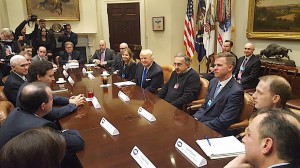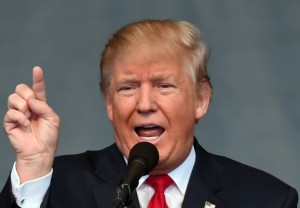
Pressure from the CEOs of Ford, General Motors and Fiat Chrysler may have helped derail President Trump's border tax plans.
The chances that the Trump administration will be able to impose a border tax on imports into the United States appears to be declining and pressure from the auto industry may have played a significant role.
Early in his presidency, Trump indicated that he viewed the border tax as tool for rebuilding the manufacturing base in the United States, which was one of, if not the central promise he made repeatedly during the contentious 2016 Presidential campaign.
However, chances of the Trump administration triggering a trade war with the border tax appear to have diminished.
“There won’t be a border tax. That idea is basically dead,” Nariman Behravesh, chief economist for IHS Markit, said during a presentation to NADA- J.D.Power Automotive Forum in New York City.
Behravesh said the potential of a trade war is one of the factors that could undermine economic growth right across the globe. But markets have discounted the prospects of trade war as Trump has dialed down his rhetoric on imports.
The value of the Mexican peso, which had taken a beating as Trump took office, has recovered, he said. The recovery of the peso suggests that currency traders don’t believe Trump will push the U.S. into a trade war with Mexico.

Almost no support and pressure from industry are pushing President Trump to dump his border tax proposal.
(GM working on border tax contingency plan. Click Here for the story.)
The idea of a border tax was never very popular with the Republican base, noted Peter Welch, NADA’s president and chief executive officer. NADA, the National Automobile Dealers Association, has mounted a substantial grass roots campaign against the border tax and it’s paying off.
In addition, Trump meets regularly with business leaders and he has heard plenty about the drawbacks of the border tax.
However, Behravesh said some type of tax reform is likely, including a tax holiday that allows U.S. companies to bring back profits held overseas. The repatriated profits would be taxed a lower rate, but the increase in revenue could help finance the infrastructure projects.
(Click Here for details about Trump’s ongoing threats to foreign automakers.)
Trump also said this week that he no longer plans to label China a currency manipulator.
The border tax, which would raise the price of all kinds of imported goods, including automobiles, was included in the discussion of tax reform. Those reforms would include a major corporate tax cut. The border tax, according to Speaker of the House Paul Ryan, would help recover the almost $1 trillion lost when the corporate tax rate is cut.
Car dealers represented by NADA fear that the increase on the price of vehicles would reduce sales. The price increase could be as much as $1,700 per vehicle, according to Toyota Executive Vice President Bob Carter, noting the figures come from independent studies.
(To see why MEMA is against Trump border tax plan, Click Here.)
Even vehicles built in the United States would be subject to the border tax because they are built with parts imported into the U.S. from what has become a global supply chain, Carter added.
